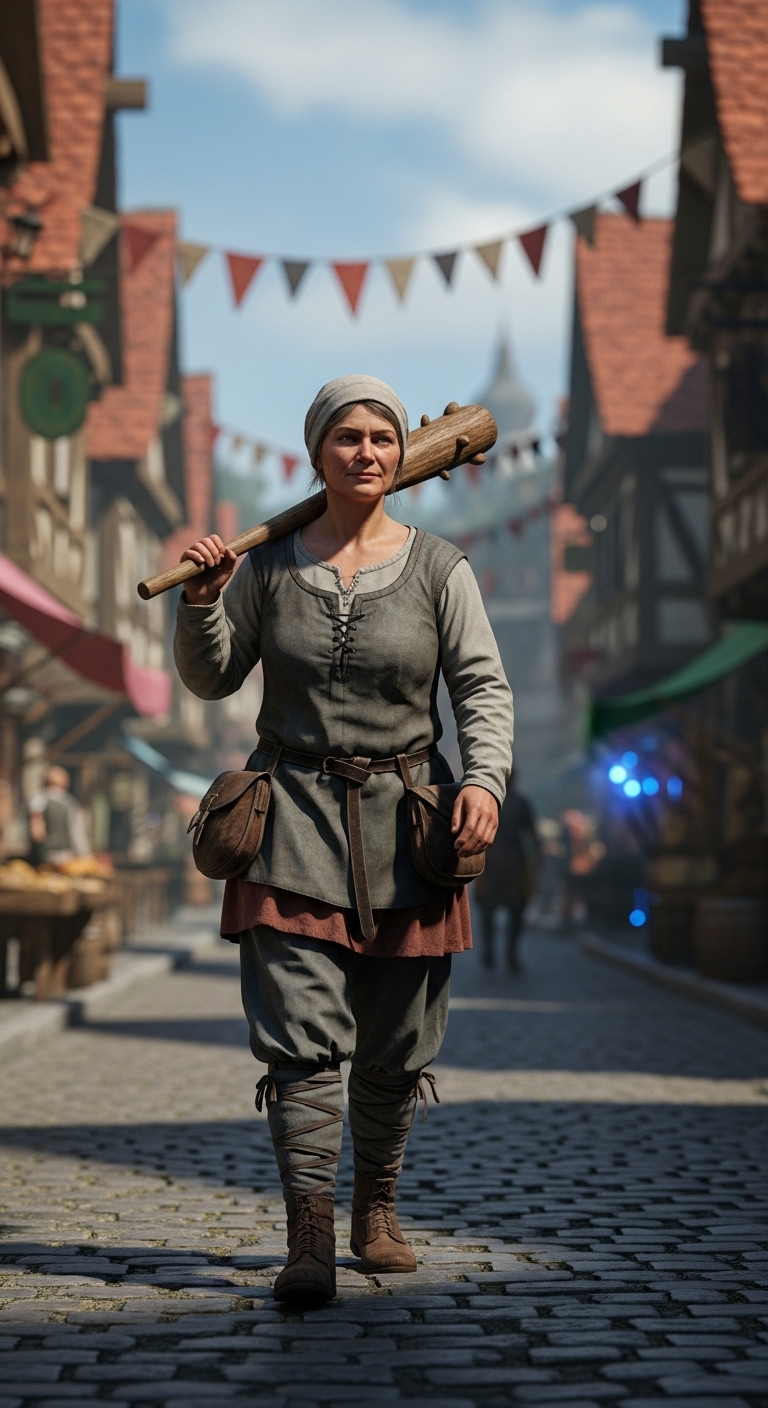Commoner

- Size: Medium or Small
- Type: Humanoid
- Alignment: Neutral
- AC: 10
- Initiative: +0 (10)
- HP: 4 (1d8)
- Speed: 30 ft
| ATTR | VAL | MOD | SAVE |
|---|---|---|---|
| STR | 10 | +0 | +0 |
| Dex | 10 | +0 | +0 |
| Con | 10 | +0 | +0 |
| INT | 10 | +0 | +0 |
| Wis | 10 | +0 | +0 |
| CHA | 10 | +0 | +0 |
- Gear: Club
- Senses: Passive Perception 10
- Languages: Common
- CR: 0 (XP 10; PB +2 )
Traits
Training. The commoner has proficiency in one skill of the GM's choice and has Advantage whenever it makes an ability check using that skill.
Actions
Club. Melee Attack Roll: +2 , reach 5 ft . Hit: 2 (1d4) Bludgeoning damage.
Lore & Background
Commoners represent the vast majority of any civilization's population - farmers, shopkeepers, artisans, laborers, and ordinary citizens who form the backbone of society. While they may lack the exceptional abilities of adventurers or the training of professional soldiers, commoners possess the skills, knowledge, and determination that keep communities functioning. Each commoner has their own specialty, whether it's crafting goods, growing food, or providing essential services.
The life of a commoner varies greatly depending on their location, occupation, and social circumstances. Rural commoners might be farmers, herders, or woodcutters who live close to the land and understand natural cycles. Urban commoners include merchants, craftspeople, dock workers, and service providers who navigate the complexities of city life. Despite their humble status, commoners often possess deep knowledge of local customs, history, and practical skills that prove invaluable to those who take the time to listen.
Commoners are not typically combatants, but they can be surprisingly resourceful when defending their homes, families, or livelihoods. They form the citizen militias that defend towns, the angry mobs that rise against tyrants, and the grateful crowds that celebrate heroes. Their collective power and influence should never be underestimated, as they represent the will and strength of entire communities.
Combat Tactics
Commoners are not trained fighters and generally avoid combat whenever possible. When forced to fight, they rely on simple weapons like clubs, farming tools, or whatever makeshift weapons are available. They prefer to fight in groups, using superior numbers to overwhelm individual opponents rather than relying on individual skill or training.
In defensive situations, commoners use their knowledge of local terrain and structures to their advantage, setting up barricades, using elevated positions, and creating chokepoints that favor defenders. They are most effective when fighting to protect something they care about, as desperation and determination can make up for lack of training.
When commoners do engage in combat, they often employ mob tactics, surrounding enemies and attacking from multiple directions. They may throw objects, use reach weapons like pitchforks or spears, or employ fire and other environmental hazards. Their goal is usually to drive off threats rather than achieve total victory, as they understand their limitations as fighters.
Encounter Ideas
The Angry Mob: Commoners have been stirred up by rumors, propaganda, or genuine grievances, and they're seeking someone to blame for their troubles, whether justified or not.
The Desperate Defense: A community of commoners must defend their homes against monsters, bandits, or other threats, requiring the heroes to organize and train impromptu defenders.
The Witness: A commoner has seen something important - a crime, a secret meeting, or supernatural activity - but they're afraid to speak up without protection or encouragement.
The Local Expert: The heroes need information about local customs, geography, or history that only a long-time resident would know, requiring them to gain the trust and cooperation of local commoners.
Environmental Effects
Community Networks: Commoners maintain extensive social networks that can provide information, resources, and assistance to those who earn their trust and respect.
Local Knowledge: Their deep understanding of local conditions, weather patterns, and seasonal changes makes them valuable sources of practical information.
Economic Foundation: Commoners provide the goods and services that keep communities functioning, from food production to crafted items to basic maintenance and repair.
Cultural Preservation: They maintain local traditions, stories, and customs that preserve community identity and historical knowledge across generations.
Treasure
Practical Items: Tools, household goods, and everyday items that might seem mundane but could prove useful in the right circumstances.
Local Currency: Small amounts of coins and trade goods that represent the commoner's modest wealth and economic participation.
Handcrafted Goods: Items made by local artisans that might have sentimental value, cultural significance, or practical utility beyond their monetary worth.
Information: Knowledge about local events, people, and conditions that could be more valuable than gold to the right person at the right time.
Plot Hooks
The Missing Persons: Several commoners from a community have disappeared under mysterious circumstances, and their families desperately seek answers and assistance.
The Uprising: Commoners are planning a revolt against corrupt leadership, and they need help organizing their efforts or protecting themselves from retaliation.
The Plague: A disease or curse is affecting the common folk of a region, and finding a cure requires understanding their daily lives and routines.
The Hidden Hero: A seemingly ordinary commoner possesses a secret ability, hidden identity, or crucial piece of information that makes them far more important than they appear.